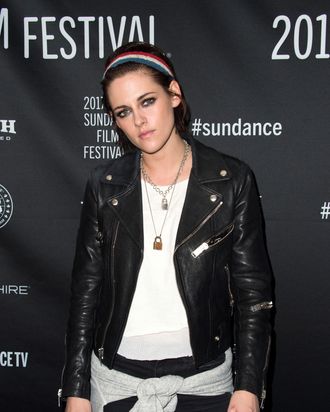
When you’re one of the most famously scrutinized women in the world, there aren’t many places you can go to get away from it all. If you sneak a bite at a restaurant, someone will tweet it. Seclude yourself at a friend’s house, and TMZ might make insinuations about the two of you. Even jetting to a far-flung island on the other side of the world could hold hidden perils: Some paparazzi might lurk offshore, ready to snap a picture of you in a two-piece.
But what if, somehow, you could make it to the bottom of the ocean? Sure, breathing might be a problem, but nobody would find you there, and it’s awfully quiet. Imagine the solitude!
It’s no wonder, then, that Kristen Stewart found herself returning to that impossibly isolated setting as she grappled with post-Twilight fame. “A couple years ago, I was kind of fixated on having this man sleeping at the bottom of the ocean,” she said yesterday at the Sundance Film Festival. “It just seemed like one of the most beautiful, contented things.”
It’s also the central image of Come Swim, the new short film that reps Stewart’s directorial debut. Starring actor Josh Kaye with murmured snatches of voice-over from Stewart herself, it was by far the most avant-garde entry in last night’s Sundance shorts program, eschewing narrative in favor of evocative, waterlogged imagery. As near as I could tell, it follows Kaye’s character in the aftermath of a relationship gone bad, capturing that post-breakup moment where you’re drowning in despair, but instead of coming up for air, you willingly take big gulps of more water.
The film begins with a beautifully sinuous wave photographed in slow-motion, then shows us Kaye stranded at the bottom of the sea and suffocating in his own apartment, bits of remembered conversation floating around in his head. “The water is nice,” murmurs Stewart, off-screen. “I hate water,” comes Kaye’s rejoinder.
Yet he can’t stop drinking. Accompanied by a fuzzy score from St. Vincent, Kaye guzzles from water bottles until they’re an empty husk like him, and when he’s not drinking, he’s drowning. He drives through an underwater dream and plunges into the ocean, and when he tries to resume his normal, workday life, reminders of the past that dot Kaye’s cubicle have him reaching for Evian once more. Whenever we return to that image of him floating near the bottom of the sea, unmoving, Stewart’s mission statement becomes clearer: He’s alone, but cocooned in his loneliness, the water providing a womb he’s not ready to leave just yet.
Or something like that. As Stewart shifted back and forth in her tennis shoes after her screening, she left her intent as ambiguous as possible, offering the genesis of some of that voice-over — “I’ve written the same poem again and again and again,” she said, “and I was like, maybe [I should] do something with it” — then handing the microphone to one of her fellow filmmakers like a hot potato.
“Can I ask you one more thing?” the moderator said, gingerly. He wanted to know how Stewart’s behind-the-scenes experience compared to a regular acting gig.
“I really don’t find too much of a distinction between the two,” she said. “When you’re doing the right thing with the right people, it feels like there’s this 800-pound thing that everyone’s holding, but the weight is equally distributed.”
So maybe, after all that, isolation can’t compare to creative communion. Stewart looked out into the audience, where her cast and crew were sitting. “I felt so lucky,” she said, beaming. “All you motherfuckers are here.”

